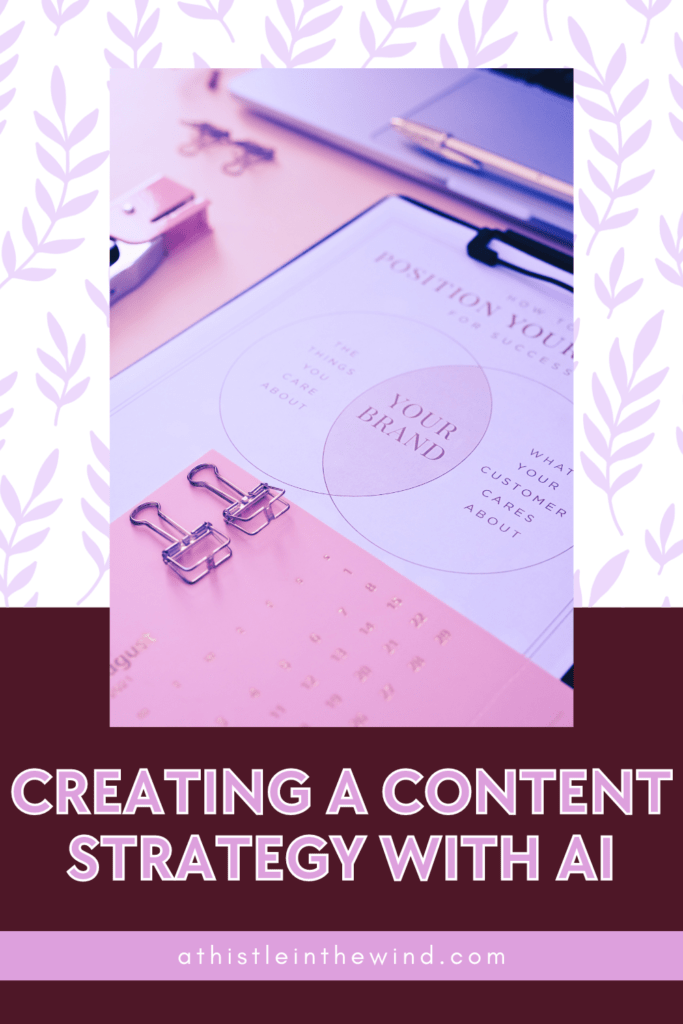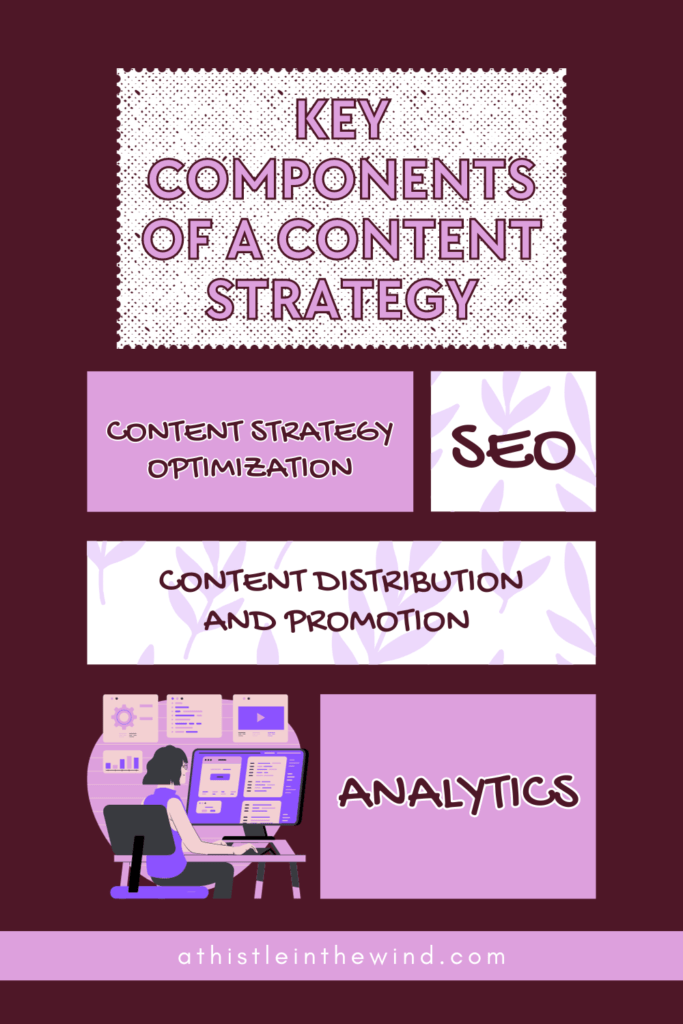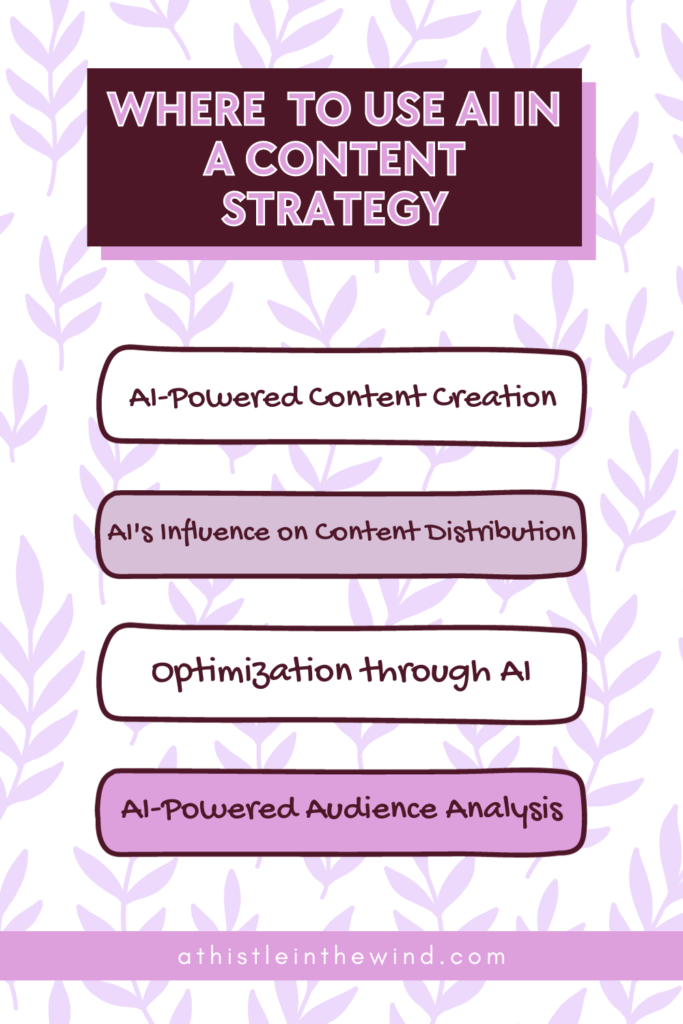How AI Tools Revolutionize Your Content Strategy

I feel like I’ve spoken about content strategy a bunch of times without really addressing it. I’m currently working on a piece on content strategy so we should be good there. But before I published that blog I thought it might be a good idea to talk about AI tools in content strategy.
Yes, I know, I’ve been talking about AI a lot, but I think it’s really important to have sufficient information on the subject. A lot of stuff that’s available online doesn’t seem to do it for me. Like, everyone says that ChatGPT helps with content creation. But no one addresses the how.
And don’t worry about that- this little “AI series” I’ve got going has quite a few topics in here to help.
So, let’s get the ball rolling.
Why Do Marketers Always Have A Content Strategy?
I’ll be honest with you; it’s kind of hard to create a blog that’ll get a lot of traffic in today’s competitive market. Even the most famous bloggers who talk about their hobbies have teams behind them. And let’s not even talk about corporations.
What I’m trying to say is that this isn’t the late 90s and early 2000s anymore, and the coveted page 1 of Google, is prime real estate. ‘Course you can run ads, but let’s be real: showing up organically has a different feel to it.
The best way to get to the top of the search result (in your specific category/target keyword) is to develop a well-crafted content strategy.
At its core, a content strategy is a carefully constructed blueprint that aligns marketing endeavors with overarching business goals. It depends on data (think keyword research, competitive research, GA-4 and more) with specific target audiences in mind.
Even if you’re blogging with no monetary incentive, you need to make sure that you get to the right audience. Crafting a robust content strategy is a cornerstone in navigating the ever-changing world of digital marketing. It steers businesses toward success in content creation, distribution, and engagement across diverse platforms.
The AI Infusion into Content Strategy

The integration of AI into content strategy has led to a seismic shift in marketing. From the ability to automate routine tasks, to conducting predictive analysis, artificial intelligence has been transformative in the industry. It has definitely reshaped content creation, distribution, and optimization.
However, as mentioned in my blog about AI writing, it’s also created a weird “naww, this should take a minute” attitude among corporate CEOs. I’m sorry, but I can’t get over this. After all, Sports Illustrated did just that. It took the “ChatGPT can write articles instead of writers” logic and ran wild with it. So much so that it actually created writers, using AI-generated images and bios to complete the look. And it was bad.
But it’s not the only one to do it.
It’s extremely frustrating as well. Because, I get it; but I don’t. Because I’m not sure if you’ve noticed it yet but I’m using AI to write this blog. If it’s done right, AI tools are awesome. But we’ve gone off on a tangent here. Let’s get back to the main topic.
Key Components of an AI-Infused Content Strategy
Understanding the audience and setting data-backed goals is fundamental to building an effective content strategy. AI tools help with comprehensive audience insights and predictive analytics. They can even lay out the groundwork for targeted strategies.
1. Content Strategy Optimization
AI tools span various categories crucial for content strategy optimization, including:
- Natural Language Processing (NLP)
- Machine Learning Applications
- Predictive Analytics Tools
- Content Optimization Platforms
- Sentiment Analysis Solutions
Strategically integrating AI tools marks the initial step. Harnessing AI’s trend analysis and user preference insights elevates content creation too.
2. SEO
The fusion of AI and SEO transforms keyword research, on-page content optimization, and predictive insights, enabling businesses to stay ahead by foreseeing search trends and algorithm changes.
3. Content Distribution and Promotion
AI-driven tools aid in identifying optimal distribution channels and intelligent scheduling, ensuring content reaches the right audience at the most reasonable times and amplifying engagement.
4. Analytics
AI-powered analytics platforms provide nuanced insights, track performance, and offer predictive analysis, enabling marketers to refine strategies proactively.

The Rise of AI in Content Strategy
AI integration has revolutionized content strategy, fundamentally altering how businesses conceptualize, create, and distribute content. This pivotal shift in approach has been the culmination of a gradual evolution and widespread adoption of AI tools across the content landscape.
As AI has matured, subsequent advancements focused on personalization and targeted content delivery. Algorithms began to analyze consumer behavior, preferences, and interactions, enabling tailored content that resonated deeply with specific audience segments. It marked a turning point, aligning content strategy more closely with individual preferences and needs.
The Paradigm Shift: Predictive Analytics and Beyond
The integration of predictive analytics propelled AI into a pivotal role within content strategy. AI now possesses the ability to predict future trends, consumer behavior patterns, and content performance through machine learning algorithms. It enables marketers to optimize design and content for maximum impact proactively, a monumental leap from its earlier stages of basic automation.
Today, AI stands as an indispensable asset in modern marketing strategies. Its evolution from mere automation to predictive analytics has significantly altered how businesses strategize, create, and disseminate content. The historical journey of AI’s integration into content strategy underscores a gradual but profound transformation, underscoring its pivotal role in driving marketing success.
Integrating Artificial Intelligence (AI) in content strategy has sparked a remarkable revolution, reshaping the content creation, distribution, and optimization landscape. This fusion of human ingenuity and machine intelligence has brought forth transformative changes, redefining how businesses engage with their audience in the digital sphere.

1. AI-Powered Content Creation
AI tools have fundamentally altered the process of content creation. Gone are the days when creating engaging and contextually relevant content relied solely on human creativity. Today, AI algorithms, such as those in platforms like MarketMuse and Clearscope, augment the creative process by analyzing vast data sets, user trends, and preferences.
These tools assist content creators by providing invaluable insights into trending topics and audience preferences and suggesting content structures and keywords that resonate deeply with specific target audiences. By leveraging AI, businesses can craft compelling content that not only captivates but also resonates with their audience on a deeper level.
2. AI’s Influence on Content Distribution
The advent of AI has revolutionized content distribution strategies. With AI-powered tools like Brandwatch and Sprout Social, marketers better understand audience demographics, preferences, and engagement patterns. This analysis aids in identifying optimal channels for content distribution, ensuring that the right content reaches the right audience at the right time.
AI-driven intelligent scheduling further enhances content distribution by predicting peak engagement periods based on historical data and audience behavior. This precision ensures that content is released when it’s most likely to garner maximum visibility and interaction, maximizing its impact.
3. Optimization through AI
Content optimization is a crucial facet of successful content strategies, and AI has emerged as a game-changer. By analyzing user trends and preferences, these tools elevate content impact by ensuring it aligns with SEO requirements and resonates deeply with the intended audience.
AI’s prowess in content optimization extends to predicting user behavior, allowing businesses to adjust their strategies proactively. These predictive insights empower marketers to fine-tune content strategies, anticipating shifts in audience preferences and ensuring sustained engagement and relevance.
4. AI-Powered Audience Analysis: Unveiling Insights
Audience analysis, when coupled with artificial intelligence (AI), becomes a powerful tool for comprehending and engaging diverse groups of individuals. AI enables a more nuanced and data-driven approach to understanding the preferences, behaviors, and demographics of a target audience.
AI-powered sentiment analysis can gauge the emotional tone of online conversations, helping organizations grasp public perception and sentiment towards their brand or products. By analyzing, you’ll be able to provide useful and actionable consumer insights for your brand. There’s no doubt that if you adapt your speech according to the types of audiences, you’ll generate a better response. If you choose to analyze your audience, it will be easier to form connections since you already know what they are interested in.

Understanding Your Audience
A successful communication in any medium implies that both the speaker and reader are in sync. This means that both have a clear idea of their motives and actions. The better you know your audience, the more you will benefit from this interaction. To leverage this treasure trove of user data effectively though requires robust technology capable enough. Using such insightful analysis allows you not just reach out but connect meaningfully with your customers. The produced content speaks directly to their unique needs or pain points thereby driving engagement higher up notch. You can win people’s trust by addressing pain points and suggesting good solutions.
In essence, as long you’re willing invest in right AI tools, sky is limit for what can achieve with personalized content creation. Knowing your target audience gives you an opportunity to understand how they decide. It will be very useful to understand your audience’s patterns – some people look for ways to save money and time, others spend more time and prefer quality over quantity. Through machine learning algorithms, AI systems can analyze vast amounts of data, such as social media interactions, online content consumption, and user demographics, to extract valuable insights.
This enables businesses and content creators to tailor their messages, products, or services with greater precision, ensuring they resonate with specific audience segments. Analyzing your audience and you’ll discover not just what potential customers are saying about your product, but your overall market. Using the right audience analysis framework can make a difference and can help you establish your core customer personas and to build them out for each stage of your buyer journey.
A Deeper Look at Audience Analysis
By leveraging AI in audience analysis, companies can adapt swiftly to evolving trends, enhance customer experiences, and ultimately strengthen their competitive edge in today’s dynamic and fast-paced digital landscape.
AI tools can help businesses to create a content strategy that is targeted and effective. By analyzing data on customer behavior, AI can identify the types of content that perform well with a particular audience segment. It can then use this information to create targeted content that resonates with that segment. AI can also help optimize the timing and frequency of content publication to ensure that content is delivered at the right time and format.
It’s All About SEO

Search Engine Optimization (SEO) is a critical aspect of content creation for digital marketing. AI tools can help to improve SEO by analyzing keyword data, optimizing titles and meta descriptions, and suggesting related keywords to include in the content. By optimizing content for SEO, businesses can improve their visibility in search engine results and drive more traffic to their website.
For businesses that operate in multiple regions or countries, content creation can be even more challenging. AI-powered translation tools can automate the translation process, making creating content in multiple languages easier. These tools use NLP algorithms to understand the nuances of language and create content that is both accurate and readable.
AI in Content Marketing
AI has revolutionized content marketing by enabling marketers to automate manual processes associated with content production. For instance, AI can help in researching and curating data, uncovering keyword and tag opportunities, predicting customer intent and more. By harnessing AI, you can craft content that speaks directly to your users’ unique needs. Tools like Persado and Retresco use machine learning to analyze user data for personalized messages and deep audience understanding. AI’s influence on social media marketing is still growing.
As AI advances, we can expect to see it utilized in increasingly sophisticated ways – from chatbots that are capable of carrying out full conversations with users to advanced sentiment analysis tools which have the ability to interpret complex human emotions.
This allows us to focus on more creative and strategic aspects of marketing. AI’s power to quickly analyze huge amounts of data will free up our time for us to devise creative, cutting-edge approaches that can give us an advantage in this highly competitive environment.
Why Should You Use AI For Content Marketing?
The use of AI-driven technology in content marketing is not only a game-changer but also a necessary step in staying ahead of the competition. With the ever-increasing demand for personalized content, the manual process becomes more cumbersome and time-consuming. AI has the power to turbocharge your content strategy. It quickly sifts through large amounts of data, sparks new topic ideas, and fine-tunes how you share your content.
Tools like CoSchedule’s AI analytics can offer a deep dive into what your audience likes and when they’re most likely to engage with you.
On top of that, platforms such as Emplifi use AI not just to grasp how audiences behave but also automate posting for the widest reach possible. Artificial Intelligence is shaking up content marketing, with more businesses adopting AI tools to improve efficiency and accuracy. But remember – balancing automation with authenticity is crucial, as we can’t replace real empathy or creativity with algorithms.
Don’t Miss Out: Use AI to Create A Better Content Strategy Today!
In the age of digitization, companies need to strike the right balance between artificial intelligence and human creativity to create compelling content that resonates with their audience. It’s not going to be easy, but that’s kind of where marketers need to adjust. You need to make sure that you use this incredible tool to make your life easy. If you overdo it, it can hard, real fast. So, take your time; learn the ins and out of the different AI tools available.
There’s a lot about AI I’d love to cover in the future. However, I’m going to be alternating between our usual content and AI-related stuff. If anyone has any questions, or would like any tool recommendations, feel free to reach out.
It’s not just marketing or content creation either; AI is insanely useful for product management too. I’ll write an article on AI tools that are being used in product management at some point. But until then, do your research and make the best of this golden opportunity. Fun fact: legacy media is struggling to find the right balance between AI and human input. We’re probably going to see them for a couple of years at best. In the mean time, you can totally get to the top of your game with this tool.



One Comment
Patrick
Just came across your blog. Thank you for this post!